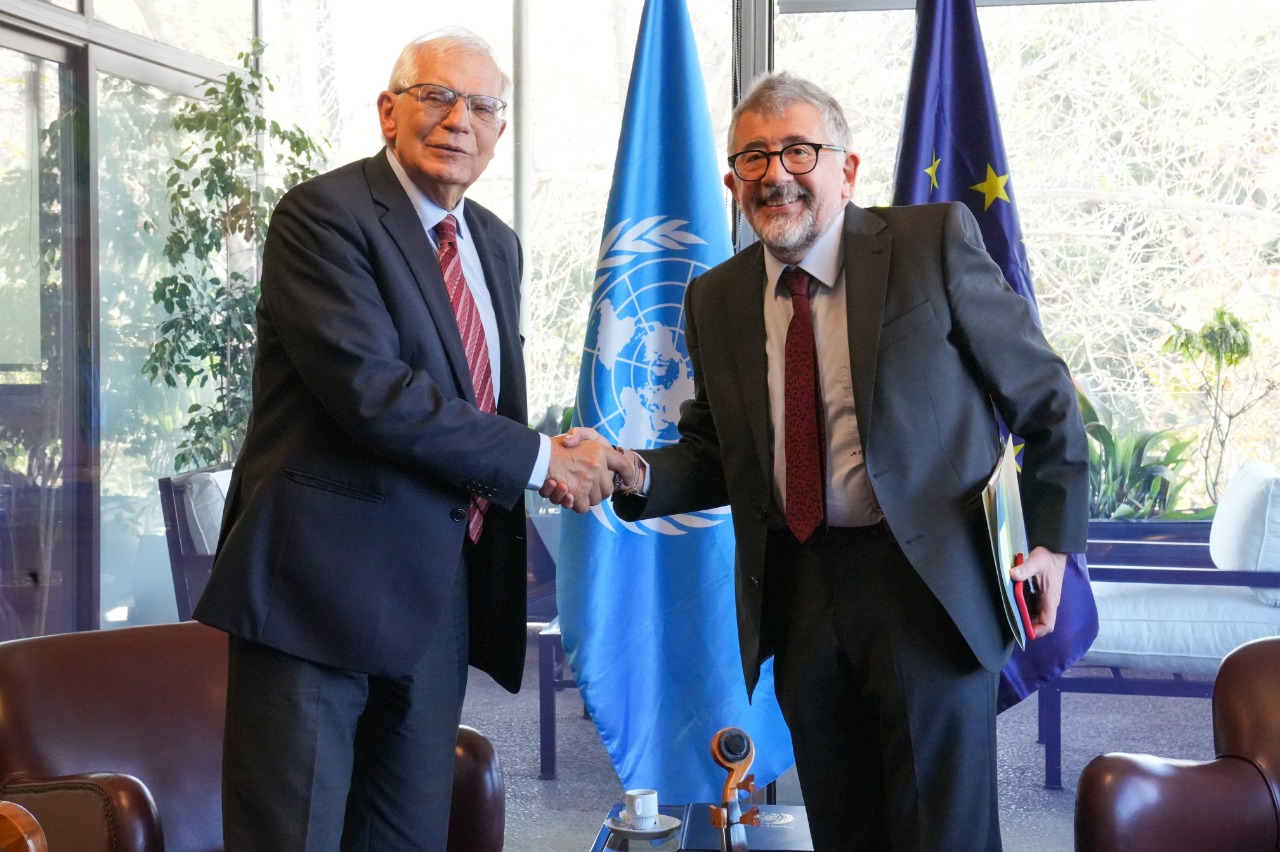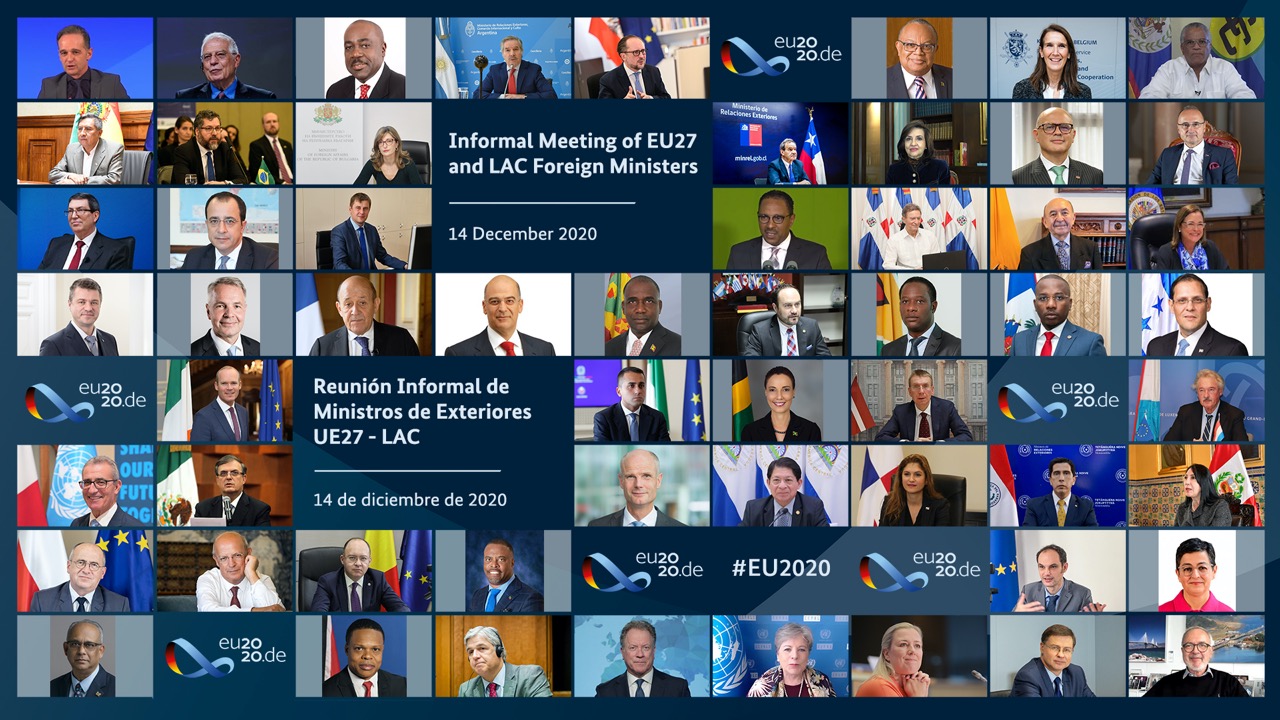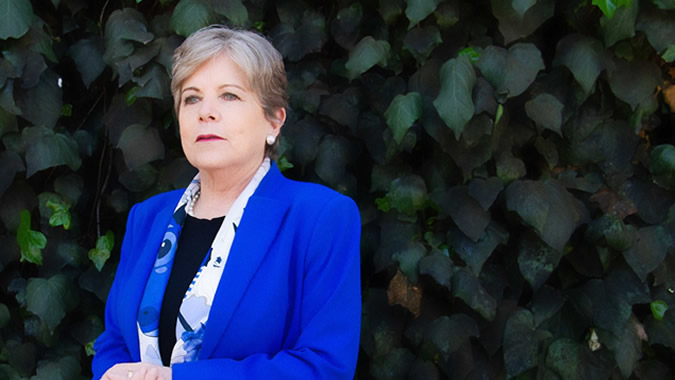European Union and ECLAC Underline Importance of Strengthening Bi-regional Cooperation in Complex Global Context
Work area(s)
European Union High Representative Josep Borrell and ECLAC Acting Executive Secretary Mario Cimoli held a bilateral meeting today at the regional commission’s headquarters in Santiago, Chile.

The European Union High Representative for Foreign Affairs and Security Policy, Josep Borrell, and Acting Executive Secretary of the Economic Commission for Latin America and the Caribbean (ECLAC), Mario Cimoli, underscored the importance of strengthening and deepening their ties of bi-regional cooperation in the complex global context caused by the armed conflict between Russia and Ukraine, during a bilateral meeting held today at the United Nations regional commission’s headquarters in Santiago, Chile.
Josep Borrell and Mario Cimoli shared their views on topics of mutual interest, such as the socioeconomic impacts of the war on both regions. In this sense, they reiterated their commitment to peace and global multilateralism and agreed to strengthen joint work and support dialogue between both regions on key areas like environmental sustainability and climate change, food autonomy, international cooperation and financing for development.
During the meeting, Josep Borrell emphasized ECLAC’s role in regional integration and expressed his commitment to continue working to foster a solid bi-regional alliance.
Mario Cimoli, on his part, underlined that Borrell’s visit to ECLAC is “a clear sign of Europe’s willingness and commitment to strengthen its ties to Latin America and the Caribbean at a momentous time for peace and, ultimately, for development.”
After the bilateral meeting, both authorities participated in the inauguration of the European Union and Chile joined together for climate action: from the global to the level, an event organized in the framework of EUROCLIMA+, of which ECLAC forms a part as one of seven implementing agencies.
At the opening ceremony, Josep Borrell and Mario Cimoli were joined remotely by Claudio Huepe, Chile’s Minister of Energy, who greeted attendees by video, and Maisa Rojas, Chile’s Minister of Environment.
During his remarks, Josep Borrell underlined that the current global context “reminds us of the extraordinary importance of joint action between the European Union and Latin America and the Caribbean, alongside the United Nations, in light of the collective challenges that the war has once again put on the table, such as the climate issue.”
“Once and for all, geopolitical considerations should support the fight against climate change and not be an excuse to leave it until tomorrow,” he warned.
Josep Borrell emphasized that now is the time to speed up the energy transition and highlighted the responsibility and leadership that the government of Chile has shown in its ambitious climate goals, as well as its decision to adhere to the Escazú Agreement.
Minister Claudio Huepe, on his part, said that Chile is very committed to developing green hydrogen, which can be a “major contribution toward the fight against climate change, a vector for our own development and an opportunity for collaboration across all levels.
Minister Maisa Rojas stressed that the government of President Gabriel Boric has committed to being the first ecological government of Chile and added that the Ministry of Environment is working according to the concept of fair socioecological transition.
“Climate change is a threat to the wellbeing of the planet’s people and health. We have a small window for joint and multilateral action to confront its impacts,” she sustained.
ECLAC Executive Secretary Mario Cimoli underscored that “in the face of the complex world panorama we are facing, packages of measures to reactivate the economy in the region should be a great opportunity to reorient our development style toward one that is more sustainable, more inclusive and lower in carbon.”
The United Nations official called for rethinking development and international cooperation to make it deeper and more stable, and underlined that environmental sustainability is not something that one country or one region achieves on its own; it is a global matter.
“Let us not lower our guard when it comes to environmental sustainability. Latin America and the Caribbean must continue collaborating with the European Union and making this issue an increasingly stronger process of multilateral action,” he concluded.
Related content

ECLAC: Concrete Opportunities Exist for Deepening the Partnership between Latin America and the Caribbean and the European Union with a View to a Green, Digital, Sustainable and Inclusive Recovery
The regional organization’s Executive Secretary, Alicia Bárcena, participated in a high-level meeting between foreign affairs ministers from both regions.

La Unión Europea, Alemania y América Latina y el Caribe son socios estratégicos para una recuperación con igualdad y sostenibilidad: Alicia Bárcena
La Secretaria Ejecutiva de la CEPAL participó hoy en una conferencia virtual organizada por la Asociación de Cámaras Alemanas de Comercio e Industria (DIHK), el Grupo de Embajadores de América Latina…
Type
Country(ies)
- European Union
- Latin America and the Caribbean